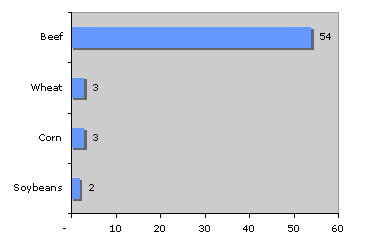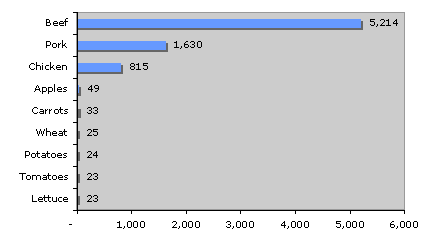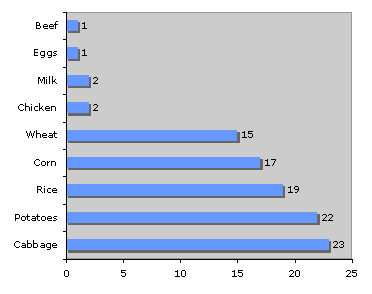Meat
destroys the planet
Animal foods are responsible for
tremendous water, land, and energy use, and greenhouse gas
emissions
Last update: March 2023
Going vegetarian is the easiest and quickest way to lower your carbon footprint, reduce pollution, and save energy and water. That's because meat production requires staggering amounts of land, water, and energy, compared to plant foods. By comparison, eating locally-sourced food has only a tiny impact.
Energy Use & Global Warming
|
1 calorie of protein for various foods (266)
|
"Please eat less meat — meat is a very carbon intensive commodity." (source)and
"In terms of immediacy of action and the feasibility of bringing about reductions in a short period of time, it clearly is the most attractive opportunity." (source) (more...)
Livestock production requires enormous amounts of energy. We put far more energy into animals per unit of food than we do for any plant crop. The main reason is that cattle consume 16 times more grain than they produce as meat,(293) so right there we have 16 times as much energy just to grow those crops, just so we can waste them on livestock.
But the energy use doesn't end there. The livestock themselves take energy to process beyond the energy that goes into their feed. And then there's refrigeration, including during transport, necessary for meat but not for grains and beans.
Wasting energy isn't problematic just because there's less and less of it to go around. (We've already used more than half the oil that exists on the planet.) It's also a problem because burning fossil fuels contributes to global warming. And raising animals for food is the driving force. As the U.K.'s Independent put it:
"Livestock are responsible for 18 per cent of the greenhouse gases that cause global warming, more than cars, planes and all other forms of transport put together."
That figure comes from no less authority than the Food and Agriculture Organization of the United Nations. (source)
TIME Magazine agrees, saying, "It's true that giving up that average 176 lb. of meat a year is one of the greenest lifestyle changes you can make as an individual."
You've probably heard about reducing energy use by buying local. But the energy savings there pales compared to going veggie. As the Organic Consumers put it, "It's how food is produced, not how far it is transported, that matters most for global warming, according to new research." The authors of that study say, "Shifting less than one day per week's worth of calories from red meat and dairy products ... achieves more GHG reduction than buying all locally sourced food." They note that production represents 83% of the energy that goes into a typical American diet, while transportation is a mere 11%. (source)
Water
|
of various foods (236)
|
Earlier we said that going meatless makes a bigger impact than any other action you can take. Here's an example: If you gave up showering, you'd save less water than what's required to make a single pound of beef. Not beef for a whole year, just one miserable pound. A whole year's worth of showers takes about 5,200 gallons, but it takes 5,214 gallons to produce a single pound of beef.
If you gave up beef, you'd save over 300,000 gallons a year. A whole lot more than you could save by never showering.
Excerpting and paraphrasing John Robbins:
Everywhere you look today, particularly in the western United States, people are seeking to conserve water. You see people washing their cars less often. People are installing low-flow showerheads and sink fixtures and low-flow toilets. You see people using drought-resistant landscaping. The vigilant turn off the water at the sink when brushing their teeth, except to rinse the brush, and when shaving, except to rinse the blade.These measures are prudent and helpful, but all of them combined don't save anywhere near the amount of water you would save by shifting toward a plant-based diet.
The great Ogallala aquifer is the largest body of fresh water on Earth, and it lies underneath some of the richest farmland in the world -- the great American grain belt. But things are changing. The Ogallala is a fossil aquifer, which means the water in it is left from the melted glaciers of the last Ice Age. It's not like a reservoir or river, which are replenished regularly from rainfuall. When the water in the aquifer is gone, it's gone.
More than 13 trillion gallons of water are taken from the aquifer every year, with the vast majority used to produce beef. More water is withdrawn from the Ogallala aquifer every year for beef production than is used to grow all the fruits and vegetables in the entire country. If we continue pumping out the Ogallala at current rates, it's only a matter of time before most of the wells in Kansas, Nebraska, Oklahoma, Colorado, and New Mexico go dry, and portions of these states become scarcely habitable for human beings. This scenario is being predicted by many leading environmentalists.(238-239)
Land
|
can be met on 2.5 acres of land for the following foods (294)
|
Grass-fed beef isn't a solution, because that requires even more land per unit of meat. And since the amount of land we have is fixed, what that really means is less meat. By going grass-fed, we'd have less meat, but still use just as much land. Animals are grain-fed because we can feed more animals that way.
And make no mistake, there are a lot of them. More chickens are killed in the U.S. every year than there are people in the world (7.6 billion chickens vs. 6 billion people).(240) There are more than one billion head of cattle on the planet today, which weigh twice as much as the human population.(291) Thinking that all those cattle can easily be grass-fed is just a fantasy.
The chart at right shows how many people can be supported by 2.5 acres of land, for various foods. I'm amazed at how many people complain that nobody can eat nothing but, say potatoes. The point isn't to suggest that anyone eat only one food, it's simply to show how animal farming wastes huge amounts of land. The point is that going meatless requires far, far less land and other resources than our normal eating habits do.
The fact that we put far more grain into livestock than they return as meat is at the heart of why animal agriculture is so bad for the planet. If we have to grow far more grain than we have to, that means we're not just using far more land, we're also using far more water, far more energy, and far more pesticides. And that extra energy use means we're creating far more pollution and greenhouse gases.
This is by no means the complete list of problems with raising animals for food. For example, we haven't even touched on the waterways ruined by animal runoff or rainforest deforestation. But really, how many more reasons do we need?
Footnotes:
Numbered notes correspond to page numbers in Food Revolution, John Robbins, 2001.


